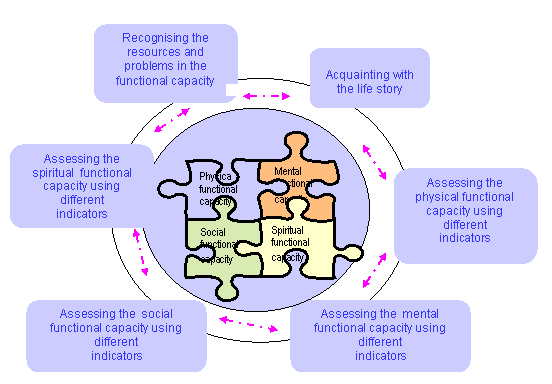
ASSESSING THE FUNCTIONAL CAPACITY
The assessment process of the functional capacity

The functional capacity of older people is assessed when there is need for care, rehabilitation and support. Many instruments / indicators have been developed in social and health for assessment.
In assessment of functional capacity of older people the immediate situation must be taken into consideration. For example mood, medication, events of the day, the state of nutrition, support given from the environment and many other factors affect the daily functional capacity and the changes experienced by the elderly. The daily changes can be significant and it can affect reliable assessment.
The assessment of the functional capacity of older people is challenging and requires great
diligence. It has to be considered if the indicator / instrument measures the required area. That is the validity of the instrument. On the other hand the reliability of the instrument has to be taken into account. The instrument is reliable if it can be used by different carers and in different times and it gives parallel results.
It is important to know the contemporary functional capacity. That makes it possible to evaluate the effectiveness of the methods and activities later used in supporting the functional capacity of the elderly. In most cases assessment and evaluation are qualitative rather than getting exact figures or numbers. By the assessment it is possible to raise the resources and problems of the elderly, where se / he needs help and what se / he can manage independently. It is important to know if the elderly is completely or partly in need of help. Even the best instruments cannot give alone sufficient picture of functional capacity, it has to be holistic. The elderly’s own opinion and experience has to be considered. There are numerous good instruments developed for assessment and each care unit has to develop their own assessment model which is best for those old people cared in that care environment.
The carer has to work in multi-professional cooperation in the assessment of functional capacity. By using the basic instruments the carer can evaluate are they sufficient and what kind of information is still needed. If deeper information is needed the care can consult e.g. physiotherapist, occupational therapist, speech therapist, psychologist, social worker, deacon or theologist. It is also important to know the life story of the elderly and comprehend what has been the normal functional capacity for the elderly in earlier years.